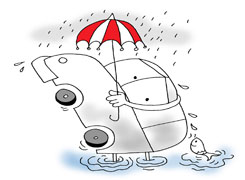Sanjib Jha |66 Answers |Ask -Follow
Insurance Expert - Answered on Jun 21, 2022

My family (aged 54 years) is covered under ECHS (Ex-servicemen Contributory Health Service) for the last thirty years. I have family floater health hospitalisation policy in two different insurance companies. Three years back, she had some issues related to her blood disorders. During the blood transfusions, we have made claims in the insurance cover.
It took few months to diagnose the issue. Finally it was diagnosed as 'a type of blood disorder'. I have availed the hospitalisation and treatment facilities from ECHS.
Now she has recovered (and under medication) for the last two years. She is leading normal life. My query is:
Can I declare and have Critical illness included coverage in the health insurance? (Earlier I was denied as permanent exclusion -IRDA).
Can I continue the existing health coverage from the insurance from other than Critical illness? (I can get ECHS facility, but there are limitations). Since she is alright, will the insurance companies accept? We are ready for relevant medical tests as required.
We seek your advice.
Any medical condition which arises after the waiting period of the policy will be covered in the health policies. Which is why check for the waiting periods associated with different ailments in your policy document.
You may like to see similar questions and answers below
Sanjib Jha |66 Answers |Ask -Follow
Insurance Expert - Answered on Jun 10, 2022
Sanjib Jha |66 Answers |Ask -Follow
Insurance Expert - Answered on Oct 12, 2022
Milind Vadjikar |1238 Answers |Ask -Follow
Insurance, Stocks, MF, PF Expert - Answered on Oct 23, 2024
Moneywize |181 Answers |Ask -Follow
Financial Planner - Answered on Nov 02, 2024
Ramalingam Kalirajan |8867 Answers |Ask -Follow
Mutual Funds, Financial Planning Expert - Answered on Jun 02, 2025
Dr Nagarajan J S K |712 Answers |Ask -Follow
NEET, Medical, Pharmacy Careers - Answered on Jun 06, 2025
Dr Nagarajan J S K |712 Answers |Ask -Follow
NEET, Medical, Pharmacy Careers - Answered on Jun 06, 2025
Dr Nagarajan J S K |712 Answers |Ask -Follow
NEET, Medical, Pharmacy Careers - Answered on Jun 06, 2025
Dr Nagarajan J S K |712 Answers |Ask -Follow
NEET, Medical, Pharmacy Careers - Answered on Jun 06, 2025
Dr Nagarajan J S K |712 Answers |Ask -Follow
NEET, Medical, Pharmacy Careers - Answered on Jun 06, 2025
Dr Nagarajan J S K |712 Answers |Ask -Follow
NEET, Medical, Pharmacy Careers - Answered on Jun 06, 2025
Nayagam P P |5836 Answers |Ask -Follow
Career Counsellor - Answered on Jun 06, 2025
Nayagam P P |5836 Answers |Ask -Follow
Career Counsellor - Answered on Jun 06, 2025
Nayagam P P |5836 Answers |Ask -Follow
Career Counsellor - Answered on Jun 06, 2025
Dr Nagarajan J S K |712 Answers |Ask -Follow
NEET, Medical, Pharmacy Careers - Answered on Jun 06, 2025





















